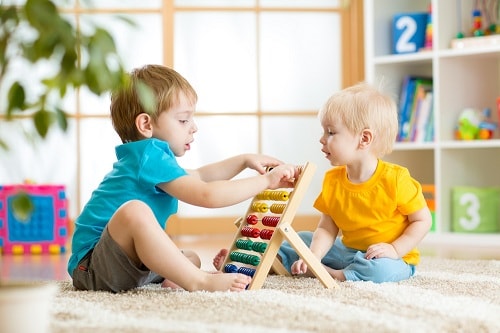Tips for mothers on 5 skills to help children learn math before entering kindergarten
Parents can help children understand basic math concepts by counting toys or steps.
Parents play an important role in teaching their children math early, through everyday activities. This helps build skills for children, laying the foundation for later learning.
1. Counting numbers and forces
According to Maryland state standards, children are expected to demonstrate simple counting skills before entering kindergarten. Specifically, children need to be able to count to 20, sort numbered cards, determine the size of a small group without counting, and understand that the size of a group will not change no matter what order the objects are arranged in.
Children also need to understand cardinality (the number of elements in a set), which means they should understand that the last item counted represents the number of objects in the set.
 |
| Children learn math through play. |
This skill is easy to acquire, through practicing counting the number of toys to clean up or the number of steps from the kitchen to the bedroom. Parents can point to the numbers on the clock or phone to help children get familiar with it.
When you go to the grocery store, ask your child to find certain numbers. When you are driving, ask your child to read the numbers on license plates or count the cars that pass by.
Games and activities that involve counting aloud, such as jumping rope, hopscotch, or clapping, also help foster this skill.
2. Calculation and algebraic thinking
Kindergarteners are often required to do simple addition and subtraction using objects. Parents can introduce this task to their children every day, such as getting the correct number of plates and forks when setting the table for dinner.
Spoken language is important, so incorporate math into it, for example: "How many more plates do we need?" During play, you can use toys and say things like: "I'm going to give you one of my cars. Let's see how many you have now."
3. Numbers and calculations within 10
Counting fingers, toes, coins or coins is a good way for children to memorize the numbers from 1 to 10. You can play store with your child, using coins to buy toys with different amounts of coins for each toy. While playing, discuss how many toys can be bought with 10 coins.
4. Measurement and classification
Kindergarteners will have to sort objects according to their features (shape, color, and size), or identify features that help objects fall into groups. They will also have to sort objects by some measurable feature, such as from larger to smaller.
Parents can teach children about measuring early in the kitchen by using spoons and cups. Children can also sort utensils, recently dried clothes, or toys before putting them away.
Additionally, preschoolers often have to compare more than and less than, longer than and shorter, heavier than and lighter. Parents can help their preschoolers get used to these tasks by emphasizing comparative phrases at home. When your child is standing next to you in the kitchen, ask questions like, "Can you get me the biggest bowl?" or "Can you put the smaller fork on the table?"
5. Geometry
Early geometry skills include naming and identifying 2D shapes such as circles, squares, and triangles. Children need to understand that shapes of different sizes and orientations can still be the same shape. Children should also recognize the similarity between circles and spheres, and use informal names such as “box” and “ball” to identify three-dimensional objects.
Parents can direct their child's attention to shapes found in their environment. While walking, point out that a wheel is a circle and ask your child to find other circles.

